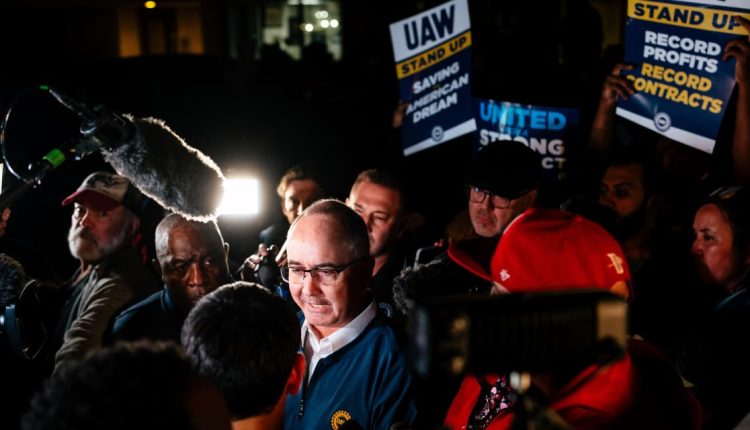President Joe Biden came down firmly on the side of striking auto workers on Friday, saying they haven’t shared in the ‘record profits’ made by Ford, GM, and Stellantis.
At a brief news conference, Biden told reporters that the companies have had record profits over the past few years, but those profits “have not been shared fairly, in my view, with those workers.”
The United Auto Workers launched a strike at three auto plants after its demands for significant wage increases and other contract measures weren’t met by 11:59 p.m. ET on Thursday. Sites of the walkout: a
General Motors
plant in Wentzville, Mo.; a
Stellantis
assembly complex in Toledo, Ohio; and part of a
Ford Motor
factory in Wayne, Mich.
Two hours before the deadline, union President Shawn Fain said “for the first time in our history we will strike all three of the Big Three at once.”
Fain had floated the possibility throughout the summer on behalf of a workforce he said was fed up with stagnant wages, concessions from years past, and plant closures that wore families down.
In an interview with CNBC on Friday, GM Chief Executive Mary Barra said she believes the strike could be resolved “very quickly.” The company also acknowledged the strike at the Missouri factory.
“We are disappointed by the UAW leadership’s actions, despite the unprecedented economic package GM put on the table, including historic wage increases and manufacturing commitments,” the company said, adding it would continue to bargain in good faith.
Stellantis said it was “extremely disappointed by the UAW leadership’s refusal to engage in a responsible manner to reach a fair agreement in the best interest of our employees, their families and our customers.”
Ford issued a statement after Fain’s remarks: The “UAW’s counterproposal tonight showed little movement from the union’s initial demands.” The union’s proposal would more than double Ford’s UAW labor-related costs, the company said..
UAW represents some 150,000 workers at the Big Three car makers: Ford (ticker: F), GM (GM), and Chrysler and Jeep parent company Stellantis (STLA).
In their quest for higher wages and other benefits, Fain made no secret of treating the contract expiration date as a hard deadline. The union leader was narrowly elected to his post in March after campaigning as an outside candidate who would fight for members in bargaining.
On wages, the UAW has pressed for a 40% pay increase, spread out over a four-year contract—to match what it said was a similar rise in CEO pay—and to end a tiered-wage system that has put in place lower starting pay for new hires since 2007.
For those newer employees, it can take eight years to reach top pay of about $32 an hour. UAW wants the path to top pay, known as “progression,” cut to just 90 days.
The union is also demanding cost-of-living-adjustments to help counter inflation, job security measures like the right to strike against plant closures, more paid time off, and enhanced retiree benefits.
Current labor costs, including benefits, run about $65 an hour on average at the Big Three, according to The Wall Street Journal, compared with $45 at electric vehicle maker
Tesla
and $55 at Asian car manufacturers. If the gap becomes too wide, company officials fear they will be at a disadvantage to nonunion rivals such as Tesla (TSLA), the electric vehicle leader.
GM said earlier Thursday it made a “record offer” that included a 20% pay increase over the course of the contract, a shorter, four-year path to top pay, and two weeks of parental leave and up to five weeks of vacation.
Ford Chief Executive Jim Farley said Wednesday the company had put forward a “historically generous offer,” but hadn’t received a genuine counterproposal from the UAW.
For its part, Stellantis on Wednesday said the company’s bargaining team approached “each discussion with…a commitment to reaching a fair agreement….”
The strategy of a partial strike was designed to give the union maximum flexibility at the bargaining table, Fain told his membership via livestream on Wednesday.
The approach also could help the UAW stretch out its $825 million strike fund, which it will use to pay workers who are striking about $500 a week.
The union is employing new tactics this time around. Rather than picking a single company as a strike target, Fain has said since bargaining began in July that strikes could happen against any of the companies, or all three of them.
Fain made a show of throwing earlier company counterproposals in the trash when he said they failed to value workers. He has emphasized the companies’ profitability and accused them of corporate greed.
“We’ve been working hard trying to reach a deal for economic and social justice for our members,” Fain said Thursday night. “We have been firm. We are committed to winning an agreement with the Big Three that reflects the incredible sacrifice and contributions UAW members have made to these companies.”
Write to Catherine Dunn at [email protected]
Read the full article here

